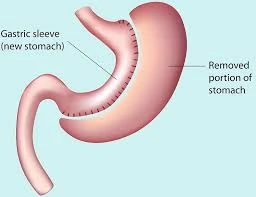Obesity
Obesity is a chronic medical condition characterized by an excessive accumulation of body fat that can negatively impact health. It is a growing global concern, affecting people of all ages and socioeconomic backgrounds. Obesity is often measured using the Body Mass Index (BMI), where a BMI of 30 or higher is classified as obese.
This condition is associated with numerous health risks, including diabetes, cardiovascular diseases, and joint problems. Factors contributing to obesity include genetics, lifestyle choices, unhealthy diets, physical inactivity, and environmental influences. Addressing obesity requires a holistic approach, focusing on lifestyle changes, balanced nutrition, regular physical activity, and, in some cases, medical intervention.
What is Obesity?
When you have too much body fat, you are considered obese. It is a complicated, long-term illness that can impair your general well-being and standard of living. Serious medical issues can result from obesity.
If you’ve become obese, you are not obese by yourselves. In the US, two out of five persons suffer from this prevalent illness. A medical professional can assist you in determining the best course of action for your body and health.
Symptoms and Causes
What Symptoms Of Obesity?
BMI classifications
Medical professionals use your BMI to categorize obesity. Providers base their suggestions for weight loss on three broad categories of obesity. These classes are:
- Class I obesity: Density in kilograms every per square meter (BMI): 30 or below 35 kg/m²
- Class II obesity: BMI 35 kg/m²
- Class III obesity: BMI 40 kg/m².
It’s essential to remember that the BMI scale is not an accurate indicator of any particular health risk.
Waist circumference
Where you carry excess weight may indicate that you are more susceptible to the health problems that obesity can bring about. If a person was assigned female at birth (AFAB), their waist circumference must be more than 35 inches; if they were chosen as male at birth (AMAB), it needs to be 40 inches may be associated with an increased risk of cardiovascular disease or Type 2 diabetes, according to the U.S.
What causes obesity?
Obesity is essentially the result of consuming more calories than your body can utilize. There are several reasons why you might consume more food than your body requires:
- Certain medications: Weight gain may result from medications you take to treat other diseases. Beta-blockers, steroids, antidepressants, anti-seizure drugs, and diabetes meds are a few examples.
- Disability: Obesity is particularly common in adults and children with learning and physical difficulties. Physical restrictions as well as a lack of finances and specialised training may be factors.
- Eating habits: Being overweight can result from eating ultra-processed foods, high-sugar foods and beverages, foods high in saturated fat, and taking more calories than your body requires.
- Genetics: Obesity-susceptibility genes, affecting hunger, are present in obese people. It’s unclear if overweight individuals share the same genetic composition.
- Lack of physical activity: Examples of this include watching TV, playing video games, and using your laptop or mobile device.
- Lack of sleep: The hormones that regulate appetite can be impacted by a lack of at least seven hours of sleep.
- Stress: Your body and brain respond to stress by producing more hunger-controlling hormones like cortisol. Stress increases the probability that you will consume comfort foods that are heavy in fat and sugar, which your body stores as excess fat.
- Underlying health issues: Being overweight is a side effect of conditions which includes metabolic conditions and polycystic ovarian syndrome, or POOS. Eating high-calorie foods that stimulate your brain’s pleasure centers might result in mental health conditions like anxiety and depression.
What are the complications of obesity?
Your body is impacted by obesity in an assortment of ways. In this case, it might result in metabolic alterations that raise your chance of developing severe diseases. Obesity could additionally have an impact either directly or indirectly on your general well-being.
Metabolic changes
Your body improves your metabolism from food into energy to function. When it has more than it needs, your body turns excess calories into lipids and stores them as body fat. Fat cells essentially swell up when no more tissue is available to store lipids. Infectious hormones and chemicals are produced by expanded fat cells.
Insulin resistance, which results from inflammation, prevents your body from using insulin to reduce blood sugar and fat levels. High blood pressure is caused by elevated blood sugar and fat levels. A common contributing factor to obesity is metabolic syndrome. Additionally, the syndrome raises your chance of contracting illnesses like:
- Cardiovascular diseases: Cardiovascular diseases such as chronic heart failure, coronary artery disease, and other cardiovascular disorders are all considerably stronger by obesity.
- Fatty liver disease: Your liver, which is in charge of purifying your blood, receives excess fats that are in your blood. Chronic liver inflammation (hepatitis) and long-term liver damage (cirrhosis) can result from your liver retaining too much fat.
- Gallstones: Elevated blood cholesterol levels raise the risk of gallbladder disorders and cholesterol gallstones by causing cholesterol to collect in the gallbladder.
- Kidney disease: Probably the most prevalent chronic kidney disease of high blood pressure and type 2 diabetes.
- Type 2 diabetes: Additionally, obesity increases the chance of Type 2 diabetes.
Obesity raises your risk of dying young from all causes, according to statistics. Research indicates that a mere 5% to 10% weight loss can lower that risk.
Direct effects
Excessive body fat can strain and stress your musculoskeletal system and block your respiratory system’s organs. This helps to:
- Arthritis.
- Asthma.
- Back pain.
- Obesity hypoventilation syndrome.
- Sleep apnea.
Becoming obese elevates the probability of getting illnesses and conditions like the following:
- carcinomas of the esophagus, pancreas, colon, breast, uterus, and ovaries.
- Depression and mood disorders.
- Female infertility and pregnancy complications.
Diagnosis and Tests
The doctor who treats you during your visit will measure your waist circumference, height, and weight. They might perform body composition tests such as bioelectrical impedance analysis or a bone density test scan. This test uses the speed at which an electrical current flows through your body to determine your body composition. They intend to know about your general health more than anything else. They shall inquire about:
- Your history of illnesses and therapies, such as prescription drugs. They might inquire about the health of your biological relatives.
- Your weight history, mentioning your experience using any weight-loss techniques you have explored.
- Your lifestyle, includes your present food patterns, sleeping patterns, and level of daily activity.
- Your mental well-being. They could ask about stress and other issues that might have an impact on your mental health. Eating more can result in stress and other problems. In addition to checking your vital signs, your doctor could prescribe certain blood tests.
Management and Treatment
What is the treatment for obesity?
You and your healthcare physician will collaborate to determine a weight loss strategy that suits your needs. Since everyone’s situation is unique, determining which therapy is most effective may need some trial and error:
- Modifying your diet: You are special. It also means that you should adjust your diet according to your needs. There are methods for preparing meals that are high in nutritious foods. Your healthcare professional can recommend dietary regimens that have been scientifically established to work, such as the DASH or Mediterranean diets. These differ from other diets that have drawbacks and restrictions. They are more akin to a collection of constructive rules that can assist you in reaching your dietary objectives.
- Including activities in your day: There are numerous methods to increase your level of activity, which burns calories.
- Mental health support: Positive changes can be supported by cognitive behavioral therapy (CBT), support groups, and counseling. They can also help you resolve psychological or emotional problems that might be preventing you and manage stress.
Medication for weight loss
Your doctor might advise you to include medication in your weight loss regimen. While they may approach weight loss from a different perspective, medications are not the only solution. In one example, several of the brain connections that influence hunger can be blocked by appetite suppressants. drugs suppressed also have been:
- Bupropion-naltrexone (Contrave®): may cut down on food intake and ambitions.
- GLP-1 agonists: reduce malnutrition, delay feelings of feeling stuffed, and lower blood sugar.Ozempic® is an example of a GLP1 agonist.
- Semaglutide (Wegovy®) and/or tirzepatide (Zepbound®): Suppresses appetite. This drug may be administered in conjunction with a GLP-1 agonist by caregivers.
- Liraglutide (Saxenda®): Reduces appetite and slows digestion.
- Orlistat (Xenical®, Alli®): reduces your gut’s intake of fat.
- Phentermine-topiramate (Qsymia®): Makes you less hungry.
- Phentermine (Adipex-P®, Lomaira®, Suprenza®): Decreases your appetite. It is permitted to be used for no less than three months at a time.
Weight loss surgery
To control how many calories you can consume and absorb, bariatric surgery operations alter your digestive tract, mostly your stomach but occasionally your small intestine as well. Additionally, they can lessen the signals of hunger that are sent from your digestive system to your brain. Among the bariatric procedures are:
- Duodenal switch.
- gastric band (LAP band).
- Gastric bypass (Roux-en-Y).
- Gastric sleeve (sleeve gastrectomy).
Prevention
The reason for this is that your body regulates your body mass by adjusting its systems to balance your hunger cues with the energy consumption from your everyday activities. Your weight may increase on the scale or in the BMI table as a result of that new set point. You can avoid obesity by looking at your habits and making sensible changes today. Here are a few instances:
- Make small changes: Do you regularly reach for high-calorie snacks or “pick-me-ups” like sugary drinks? Think about getting a new one. Ten more pounds might be gained in a year with just 150 extra calories per day.
- Add physical activity: As an alternative, think about how you could discover an activity that suits your fitness level and needs to burn an additional 150 calories per day.
- Shop intentionally: Make sure your home is stocked with nutritious foods, and reserve sweets and snacks for rare occasions.
- Cultivate overall wellness: Spend less time on screens and spend more time outside enjoying the fresh air. To maintain healthy hormone levels, strive to get enough sleep and manage your stress. Pay more attention to healthy habits and positive improvements than to how your weight changes as a result of your efforts.
Summary
Obesity raises your risk of developing certain dangerous illnesses. However, being obese does not imply that you already have those illnesses or that there is no way to avoid them. Keep in mind that even a 5% to 10% reduction in weight will greatly reduce your health risks. Maintaining weight loss can be achieved by adhering to a long-term treatment strategy.
FAQs
What is obesity’s primary cause?
Overeating and less exercise are the primary causes of obesity. A large portion of the excess energy will be stored by the body as fat if you ingest large amounts of energy, especially sugar and fat, and do not expend it through physical activity and exercise.
What is the obese BMI?
A body mass index (BMI) of 25 or above corresponds to overweight, while a BMI of at least 30 is classified as obese. Higher-than-optimal BMI was expected to be the cause of 5 million noncommunicable disease (NCD) deaths in 2019.
Is it possible for fasting to help prevent obesity?
The lipid profile benefits from intermittent fasting, which is additionally connected to weight loss, a change in the distribution of abdominal fat in individuals with type 2 diabetes and obesity, and improved glucose control.
Who is vulnerable to obesity?
The latest data from the National Health and Nutrition Examination Survey shows that obesity is more common among persons aged 60 and above than among younger adults. Children are also impacted by the issue.
References
- Obesity. (2024, October 29). Cleveland Clinic. https://my.clevelandclinic.org/health/diseases/11209-weight-control-and-obesity
- World Health Organization: WHO. (2020, February 21). Obesity. https://www.who.int/health-topics/obesity#tab=tab_1
- Moores, D. (2023, May 15). Obesity: What you need to know. Healthline. https://www.healthline.com/health/obesity
- Obesity. (2024, November 25). In Wikipedia. https://en.wikipedia.org/wiki/Obesity
- What are overweight and obesity? | NHLBI, NIH. (2022, March 24). NHLBI, NIH. https://www.nhlbi.nih.gov/health/overweight-and-obesity
- Obesity – Symptoms and causes. (n.d.). Mayo Clinic. https://www.mayoclinic.org/diseases-conditions/obesity/symptoms-causes/syc-20375742





123 Comments